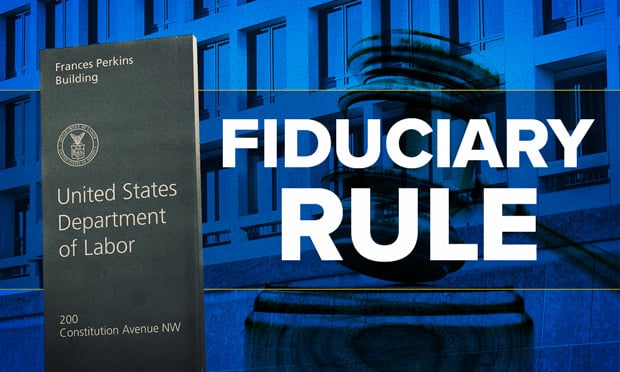The Labor Department will more than likely propose fundamentalchanges to the fiduciary rule and its prohibited transactionexemptions, resulting in a delay of full implementation of thecontroversial regulation for at least one year, and perhaps longer,according to attorneys with Drinker Biddle & Reath.
|Proposed revisions to the rule will be subject to public commentand other administrative requirements, as the DOL is committed tostrictly following the letter of the law to avoid legal challenges,explained attorneys from the firm during a recent webinar.
|While both a delay of the January 1, 2018 full implementationdate and revisions to the rule would be welcomed by stakeholderswho view the existing regulation as onerous, the attorneyscautioned that brokers and advisors to 401(k) plans face key compliancerequirements under the existing transition period for the rule,which began June 9.
|Specifically, brokers who have been advising 401(k) plans asnon-fiduciaries are required to amend 408(b)(2) fee disclosurerequirements by August 7 of this year.
|Under the 408(b)(2) reg, which Labor issued in 2012 as a way toassist plan sponsors in complying with their fiduciary duties underthe Employee Retirement Income Security Act, plan service providersare required to disclose their “status”—whether or not they areserving in a fiduciary capacity.
|“For the most part, broker-dealers, and insurance agents andbrokers, have taken the position that they were not fiduciaries andtherefore did not make the fiduciary disclosure,” wrote Fred Reish,chair of the financial services ERISA team at Drinker Biddle, in arecent blog post.
|But under the fiduciary rule’s impartial conduct standard, whichwent into effect on June 9, advisors to plans with less than $50million in assets are required to serve as fiduciaries, and adhereto the impartial conduct standards’ requirement to give advice in aplan’s best interest.
|“Under the new rules it’s hard for an adviser to work with aplan without being a fiduciary,” wrote Reish.
|The 408(b)(2) disclosure requires plan providers to communicatechanges in their fees or status within 60 days of the change ofservices, which puts the deadline at August 7, if counted from June9, when the impartial conduct standards took affect.
|A failure to amend the proposals would make any compensationpaid to brokers or advisors prohibited.
||408(b)(2) separate from rule, but impacted by it
|
Plan advisors, whether fiduciaries before June 9 or not, havebeen feverishly preparing to comply with the fiduciary rule.
|The disclosure requirements under 408(b)(2) are wholly separatefrom the rule itself, though clearly impacted by it.
|Reish fears many broker-dealers are not connecting the dots,given their focus on compliance with the rule and itsexemptions.
|“I know that I have educated a number of my broker-dealerclients about that requirement,” Reish said in an email. “I believethat, but for that education, some of them would not have becomeaware of it.”
|The fee and status disclosure requirements under 408(b)(2) onlyapply to advice on defined contribution plans—they are not requiredwhen advising IRAs in the retail market, underscored Reish.
|“These are separate sets of rules and the fiduciary regulationand exemptions do not address 408(b)(2),” added Reish. “A serviceprovider has to make that connection upon becoming a fiduciary. Thefocus on complying with the fiduciary rule does not necessarilylead to the 408(b)(2) disclosure rules.”
|Reish fears that a significant number ofbroker-dealers—particularly smaller ones—will inadvertently fail tomake the required disclosure of their change in fiduciarystatus.
|While the Labor Department has said that it will delay enforcingthe best interest standard during the rule’s transition period, solong as providers are making a good-faith effort to comply,regulators have not said that easement extends to 408(b)(2)requirements.
||
Other considerations for plan sponsors
|
According to Bradford Campbell, a partner with Drinker Biddle,fiduciary advisors to 401(k) plans will in many cases need to relyon the rule’s Best Interest Contract Exemption, which includes aseries of extensive, new disclosure requirements for acceptingvariable compensation and selling proprietary mutual funds.
|That places a new burden on sponsors, says Campbell. “They willhave to know every conflict of interest.”
|As fiduciaries, sponsors will need to know if their plan advisoris deploying the BIC Exemption, and whether the conditions of theBIC are enough to satisfy both the investment needs of planparticipants, and the sponsors’ own long-standing fiduciaryrequirements under ERISA.
|“That means there have to be some tough questions asked” on thepart of sponsors, Campbell said. “This rule is a triggering eventfor taking another look at existing arrangements.”
|The impartial conduct standards have also changed howrecord-keepers service plans, and the scope of communicationscall-center agents are allowed to have with plan participants.
|Those changes may require new service agreements withrecord-keepers, as well as with plan advisors. “Sponsors will wantto have something on file that shows you considered the changes,”said Campbell.
|Under ERISA, sponsors are required to monitor plan providers.One action attorneys say plan sponsors can take to assure they aresatisfying their monitoring requirement is to issue requests forproposals with some regularity. In fact, the failure to issue RFPshas been cited as evidence of fiduciary breach in several lawsuitsagainst 401(k) sponsors.
|Now that the fiduciary rule’s impartial conduct standards havebeen implemented, sponsors may want to consider if now is the timeto issue an RFP, said Campbell.
|Complete your profile to continue reading and get FREE access to BenefitsPRO, part of your ALM digital membership.
Your access to unlimited BenefitsPRO content isn’t changing.
Once you are an ALM digital member, you’ll receive:
- Critical BenefitsPRO information including cutting edge post-reform success strategies, access to educational webcasts and videos, resources from industry leaders, and informative Newsletters.
- Exclusive discounts on ALM, BenefitsPRO magazine and BenefitsPRO.com events
- Access to other award-winning ALM websites including ThinkAdvisor.com and Law.com
Already have an account? Sign In
© 2024 ALM Global, LLC, All Rights Reserved. Request academic re-use from www.copyright.com. All other uses, submit a request to [email protected]. For more information visit Asset & Logo Licensing.








